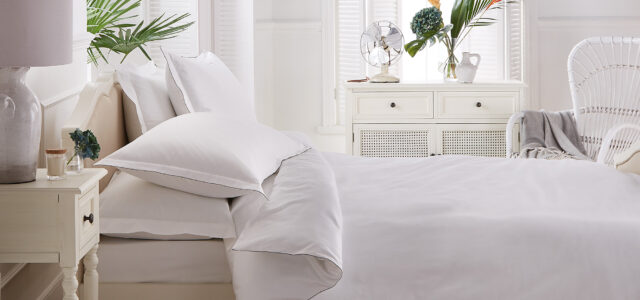
Palaces To Private Yachts…
A business that supplies Buckingham Palace and Harrods with the world’s finest, luxury bed linen, is proud to be based in Lancashire
During the 19th century, Lancashire was at the epicentre of the industrial revolution in Britain with more than 2,500 cotton mills producing half of the world’s cotton. At the time, brothers Peter and William Reed, both weavers, saw the potential for bed linen and their weaving shed became the second largest in the world.
Fast forward to the 21st century and the working mills have disappeared but the Reed legacy lives on as a last bastion of Lancashire’s prestigious cotton heritage.
A name that is synonymous with high-end luxury, Peter Reed now supplies all the Royal households, Harrods and top-class hotels around the world, as Managing Director Sean Clayton, explains: “We deal with the housekeepers at Buckingham Palace, Windsor Castle, Sandringham and Kensington Palace. We also work with film production companies and have just delivered some bed linen for a movie starring Brad Pitt and we supplied the linen for Downton Abbey.”
While Peter Reed is no longer in the weaving business, it continues to use the finest raw cotton from around the world including Giza, Supima and Sea Island cotton: “We use extra-long staple cotton, which can be spun finer to produce linen that has durability and longevity. The cotton is all sustainable and traceable and we always make sure we work with suppliers who have the same ethos.
“Our linen is woven in Italy as it is considerably wider, which is required for bed linen. We don’t really have the capacity to produce that here in the UK.
“Our suppliers totally understand the industry and the requirements of Peter Reed so we have complete continuity of quality. Our clients want the very best so to achieve that we have to use the very best cotton, the best weavers, cutters, sewers and embroiderers.”
The fact that the company no longer weaves has meant that the Peter Reed business strategy has radically changed to meet 21st century needs. Back in the late 1800s the mills were alive with the deafening clatter of looms.
Today the Peter Reed head office in Nelson is a hive of quiet activity. Daylight floods into the main cutting and embroidery room where a cutter spreads swathes of beautiful white cotton ready to be sized. In another area the gentle hum of a high-tech embroidery machine can be heard, sewing a precise baby-blue border on snow-white bed linen and in another part of the workroom are the finished products hanging crisp and pressed in all their embroidered glory, ready to be packaged in Peter Reed’s signature classic boxes and dispatched to companies and private individuals across the globe.
This is a business that has adapted to suit the luxury linen market in a world that is connected by technology. Peter Reed has a small team of 11, who can react swiftly and with agility to change, whether that’s meeting an individual client order or a replenishment order from Harrods: “We are not making a lot of product that isn’t sold, so we never discount. That might sound a bit bullish, but we say if you can’t afford Peter Reed then you can’t have it. Peter Reed is an aspirational brand and we like to keep it that way. We deal with high net-worth individuals, we put logos on the linen for their super-yachts – Peter Reed is at the highest end of the luxury-brand level.
“We have 20 days lead time up to shipping so that gives us a big advantage in the marketplace. Our minimum order is one so rather than order a container full, a business can buy one set of linen and photograph it for their brochure, which helps their cash flow,” says Sean, who gets involved in all aspects of the business, including collaborations with world-renowned designers and creatives including Giles Deacon and the late Alexander McQueen’s Sarabande Foundation: “A lot of these people approach us as a collaboration with Peter Reed represents luxury. We only work with British brands who are in the same arena – we have to be very choosy. But, so far it has worked extremely well as it puts us in front of a different audience. The beauty for us is that we branch out with them to do something a bit more creative.”
With Giles Deacon Peter Reed collaborated to create table linen based on a Bronte novel, which was embroidered with quills. With luxury lifestyle brand House of Hackney, they based one of their designs on an iconic wallpaper: “We extracted part of the design and embroidered it onto white linen. There was so much colour! Initially the team in the workroom were a little unsure as to whether they could do it, so it challenged them. The end product was superb and the team was so proud to have been involved.”
As MD, Sean also gets involved in sales, brand awareness and product development. This year will see Peter Reed producing exclusive table linen and bath linen along with bath robes and candles.
He also travels the world meeting potential clients, which he finds one of the most enjoyable aspects of his work: “I recently travelled with numerous samples, to the Middle East. I told the client about our history and that we supplied Buckingham Palace and Harrods – he placed an order without even looking at the samples,” recalls Sean.
“Another customer went to Harrods looking to buy a set of Peter Reed Sea Island cotton bed linen, which is our most expensive at £8,000. He bought two sets. That’s why we don’t discount – our product sells itself. When you buy Peter Reed you become a member of the club.”

